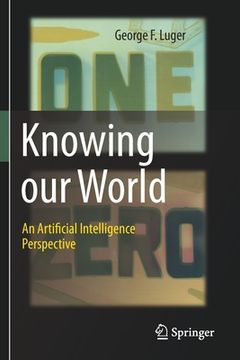Share
Knowing Our World: An Artificial Intelligence Perspective
George F. Luger
(Author)
·
Springer
· Paperback
Knowing Our World: An Artificial Intelligence Perspective - Luger, George F.
Choose the list to add your product or create one New List
✓ Product added successfully to the Wishlist.
Go to My Wishlists
Origin: U.S.A.
(Import costs included in the price)
It will be shipped from our warehouse between
Thursday, July 18 and
Thursday, July 25.
You will receive it anywhere in United Kingdom between 1 and 3 business days after shipment.
Synopsis "Knowing Our World: An Artificial Intelligence Perspective"
Knowing our World: An Artificial Intelligence Perspective considers the methodologies of science, computation, and artificial intelligence to explore how we humans come to understand and operate in our world. While humankind's history of articulating ideas and building machines that can replicate the activity of the human brain is impressive, Professor Luger focuses on understanding the skills that enable these goals. Based on insights afforded by the challenges of AI design and program building, Knowing our World proposes a foundation for the science of epistemology. Taking an interdisciplinary perspective, the book demonstrates that AI technology offers many representational structures and reasoning strategies that support clarification of these epistemic foundations. This monograph is organized in three Parts; the first three chapters introduce the reader to the foundations of computing and the philosophical background that supports the AI tradition. These three chapters describe the origins of AI, programming as iterative refinement, and the representations and very high-level language tools that support AI application building. The book's second Part introduces three of the four paradigms that represent research and development in AI over the past seventy years: the symbol-based, connectionist, and complex adaptive systems. Luger presents several introductory programs in each area and demonstrates their use. The final three chapters present the primary theme of the book: bringing together the rationalist, empiricist, and pragmatist philosophical traditions in the context of a Bayesian world view. Luger describes Bayes' theorem with a simple proof to demonstrate epistemic insights. He describes research in model building and refinement and several philosophical issues that constrain the future growth of AI. The book concludes with his proposal of the epistemic stance of an active, pragmatic, model-revising realism.
- 0% (0)
- 0% (0)
- 0% (0)
- 0% (0)
- 0% (0)
All books in our catalog are Original.
The book is written in English.
The binding of this edition is Paperback.
✓ Producto agregado correctamente al carro, Ir a Pagar.

